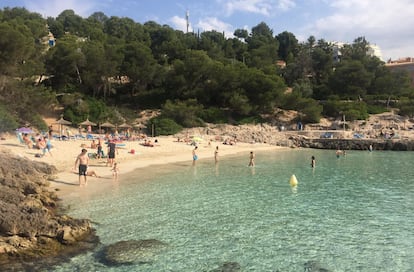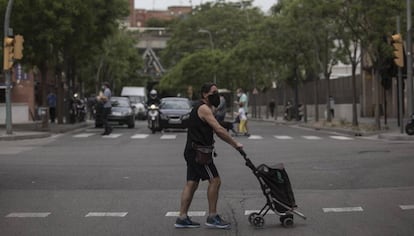Spanish regions request to move to new phases of deescalation plan
Regional authorities in Valencia have asked to move to Phase 2, while some islands may enter the last stage before the beginning of the “new normality”

Several regional authorities in Spain have sent the central government their requests to move to a new phase of the coronavirus deescalation plan. Currently in Spain, 53% of the population is in Phase 1, which allows social gatherings of up to 10 people, and 47% is in Phase 2, where there are no restrictions on outdoor activities. Here is an overview of what each region has so far requested.
Andalusia: The regional government in Andalusia has asked that the provinces of Málaga and Granada move to Phase 2 on Monday as only four coronavirus cases have been detected in both provinces since last week. According to regional authorities, Granada tested 88% of suspected coronavirus cases this week, a significant rise from the 52% recorded by the Health Ministry two weeks ago. Málaga has also increased its testing capacity from 32% to 83%, according to regional authorities.
Aragón: The regional government in Aragón will ask for some of the measures allowed in Phase 3 to be applied to rural areas. It has not yet provided more details about this proposal.
Asturias: Authorities in the small northern region have not yet indicated what they will request from the central government. Asturias is currently in Phase 2 of the deescalation plan.
Balearic Islands: The regional Balearic government has asked that the islands of Mallorca, Ibiza, Menorca and Formentera move to Phase 3 on Monday. The first three islands have only been in Phase 2 for one week, meaning they would advance ahead of the two-week time frame set out for each stage. Regional premier Francina Armengol has requested that the four islands deescalate at the same rate and for movement to be allowed between the archipelago. Currently, travel between the islands is only allowed for work reasons or instances of force majeure.

Basque Country: The region will not request any changes and will remain in Phase 2 for another week.
Canary Islands: The regional government has requested that the islands of La Gomera, El Hierro and La Graciosa, which were the first in Spain to enter Phase 1, move to Phase 3. The remaining five islands would remain in Phase 2, which they entered on Monday.
Cantabria: Under the coronavirus deescalation plan, each stage must be in place for at least two weeks. Regional authorities in Cantabria have expressed their support for this measure, meaning that it is unlikely they will request to move to Phase 3 until next week.
Castilla-La Mancha: Regional authorities in Castilla-La Mancha have asked that the provinces of Ciudad Real, Albacete and Toledo move to Phase 2. The provinces of Guadalajara and Cuenca transitioned to this stage on Monday.
Castilla y León: The regional health authorities will only request that the healthcare area of El Bierzo move to Phase 2. The entire region only entered Phase 1 on Monday.
Catalonia: The regional government has announced that it will ask the central government to consider the healthcare areas of Barcelona city and its northern and southern metropolitan areas as a single healthcare area. The choice to use healthcare areas by the regional government currently means that Barcelona residents cannot leave the city limits, while inhabitants of neighboring cities cannot enter either, as they normally would on a daily basis. Regional authorities will also ask for the healthcare areas in Girona and Catalunya Central, as well as Garraf and Alt Penedés, to move to Phase 2. Lleida will remain in Phase 1, due to an outbreak of coronavirus cases that was recently detected there.
Extremadura: This region will remain in Phase 2 for another week.
Galicia: The premier of Galicia, Alberto Núñez Feijóo, will not ask for the region to move to Phase 3 until June 8. It will, however, ask the central government to allow freedom of movement between the region’s four provinces. This request was made last week, but was denied. Currently, travel between the provinces is only allowed in “justified cases.” Feijóo will also ask that people from areas in a worst epidemiological situation than Galicia be restricted from traveling to the region.
Madrid: The Madrid region moved to Phase 1 on Monday, after the central government twice rejected its request to transition to this stage. Regional authorities have said that they want to deescalate the confinement measures as quickly as possible, but it is unlikely they will request to move to Phase 2 before the two-week period for each stage. In the meantime, the region has asked the Health Ministry to allow some activities that are only permitted in Phase 2, such as allowing students who are preparing for their university entrance exams to return to school. The premier of Madrid, Isabel Díaz Ayuso has also called for an end to the time slots allocated for outdoor activities on weekends.
Murcia: For now, the region has ruled out requesting to move to a new stage of the deescalation plan. The entire region entered Phase 2 on Monday, with the exception of the municipality of Totana, which had detected a spike in coronavirus cases.
Navarre: The region will remain in Phase 2 until the two-week period comes to an end. Regional authorities want to move to Phase 3 on June 8.
La Rioja: Regional authorities have not provided any information on whether they will ask to move to a new stage of the deescalation plan. It is currently in Phase 2.
Valencia: Regional authorities asked on Monday for the entire region to move to Phase 2 on June 1. The comarca of Rincón de Ademuz, which is located between the provinces of Teruel and Cuenca, was given permission to move to this phase on Wednesday. Residents in the comarca will be able to move freely to Cuenca.
With reporting by Pablo Linde, Silvia R. Pontevedra, Javier Martín-Arroyo, Noor Mahtani, Juan Navarro, Pedro Gorospe, Juan Carlos Espinosa, Jessica Mouzo, Mikel Ormazabal, Virginia Vadillo, Cristina Vázquez, Victoria Torres and Lucía Bohórquez.
English version by Melissa Kitson.
Tu suscripción se está usando en otro dispositivo
¿Quieres añadir otro usuario a tu suscripción?
Si continúas leyendo en este dispositivo, no se podrá leer en el otro.
FlechaTu suscripción se está usando en otro dispositivo y solo puedes acceder a EL PAÍS desde un dispositivo a la vez.
Si quieres compartir tu cuenta, cambia tu suscripción a la modalidad Premium, así podrás añadir otro usuario. Cada uno accederá con su propia cuenta de email, lo que os permitirá personalizar vuestra experiencia en EL PAÍS.
¿Tienes una suscripción de empresa? Accede aquí para contratar más cuentas.
En el caso de no saber quién está usando tu cuenta, te recomendamos cambiar tu contraseña aquí.
Si decides continuar compartiendo tu cuenta, este mensaje se mostrará en tu dispositivo y en el de la otra persona que está usando tu cuenta de forma indefinida, afectando a tu experiencia de lectura. Puedes consultar aquí los términos y condiciones de la suscripción digital.









































